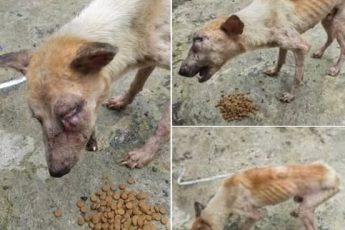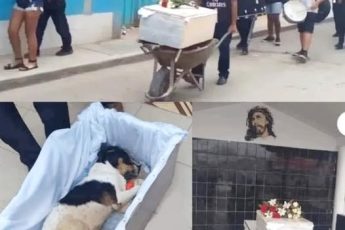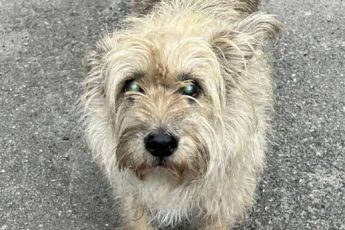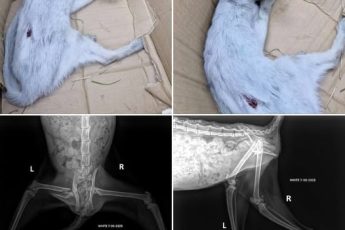When you’re a child, the forest feels like magic.
Especially in summer, especially when you’re ten and the whole world still seems kind and simple.
Marta often wandered there alone — not because she was lonely, but because something was always happening in the woods.
You could find berries, a snail on a mossy pillow, a lost bird feather — or sometimes even an old tire, which she used to make “chairs” for her dolls.
That day, sunlight filtered through the leaves, the air thick with the scent of pine and last year’s needles, and the ground softly bounced underfoot. Marta was walking slowly, tracing patterns on tree bark, when she suddenly stopped.
There was something lying in the middle of the path.
Or rather — someone.
It wasn’t a ball.
And not a toy.
It was a puppy. Very strange. Almost hairless. Covered in scabs. Thin legs. Huge, endlessly sad eyes.
He didn’t move. Only trembled. Didn’t whimper. Didn’t beg.
Just lay there, as if he had long since stopped hoping.
Marta sat down beside him. She wasn’t scared.
She reached out — and he didn’t bite. He only looked at her.
Her small palm touched the burnt, uneven skin, and she pulled back — not from fear, but from pity.
She didn’t know the words “demodicosis,” “infection,” or “contagion.”
But her heart told her — he was in pain.
“Are you alone?” she whispered. “I’ll take you.”
She took off her t-shirt, wrapped the puppy in it, held him to her chest like a doll, and slowly walked back.
The puppy didn’t resist.
He simply allowed himself to be carried.
He was light. Almost weightless.
At home, everything became a reverse fairytale.
Her parents were horrified.
First — by the sight.
Then — by the smell.
Then — by Marta’s words: “He’s mine. He was alone. In the forest.”
Her mother held back tears.
Her father called the vet.
The doctor came quickly.
An old man with a tired face, who examined the puppy and shook his head:
“He won’t last long. It’s… all neglected. Someone just threw him out like trash.”
Marta stood in the corner, fists clenched.
Her lips trembled.
She didn’t cry.
She only said:
“I’m not giving him up. We’ll save him.”
The next day, a car stopped by the house.
Two men stepped out — in uniform.
Not police. Something else.
One held a tablet.
The other showed a photo:
“Did your daughter find this puppy?”
They spoke calmly.
Evenly.
And frighteningly.
Marta immediately sensed — these people weren’t here to help.
They were here for him.
For her new friend.
For this strange, hairless bundle with eyes that had, for the first time, shown her trust.
When her mother quietly confirmed: “Yes. Found him in the forest, right on the path,”
one of the men nodded and said:
“He’s not a stray. He’s a laboratory specimen. Escaped from quarantine.
Unfortunately, your daughter violated health protocols.”
Her father’s hand trembled.
Her mother turned pale.
But Marta just held the puppy tighter.
“He’s not a thing!” she screamed.
“He’s alive! He’s scared! He understands everything!”
The men exchanged glances.
One pulled a document from his pocket.
Her mother couldn’t read it all — only caught the words “recovery,” “property,” “health risk.”
But then the vet — the same one from the day before — stepped in again.
He called.
And he came.
“You’re taking an animal that’s on the verge of death. One that no one treated. That was thrown away like test trash.
A child found him. And you want to return him… where? To a cage?”
And suddenly, the man with the tablet lowered his eyes.
Just for a moment.
And said:
“We had another escapee. It died. Was written off.
If you want — we’ll transfer him into private hands.
On one condition — isolation.”
The father agreed.
The mother too.
Marta held the puppy close.
He didn’t move.
He just placed his dry, cracked paw on her wrist.
And a new life began.
They named him Fox.
Because his gaze was clever.
Because he had survived.
And because no one knew who he used to be.
But now — he was part of the family.
The vet treated him.
Marta’s mom applied balms.
Her dad built a doghouse.
And Marta… she simply believed.
She told him fairy tales.
Sang songs.
Pointed at the stars.
And every day, a new patch of fur appeared on his skin.
First a dot. Then a spot. Then — ears.
A month passed. Then another.
And then — he started to run.
Funny. Crooked. But running.
Playing with a ball.
Licking fingers.
He changed.
He became himself.
And a year later, journalists came to Marta’s school.
A project called “Children and Animals.”
She stood before the camera, holding not a hairless lump, but a warm, fluffy, real dog in her arms.
And she said:
“They used to call him a ‘specimen.’
Now his name is Fox.
Because he’s my friend.
And because no one should ever be just a ‘specimen.’
Especially — when they have eyes like his.”
Now Fox’s photo hangs in the veterinary clinic.
Underneath, a plaque reads:
“From the forest. From the lab.
From darkness — into family.”





